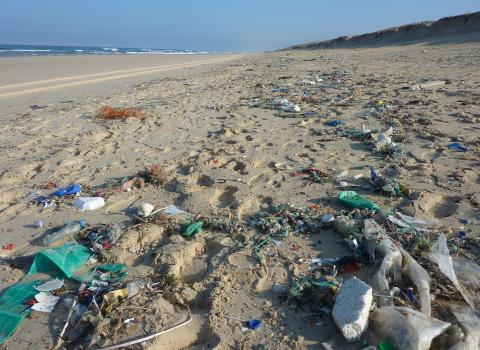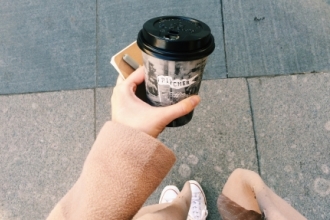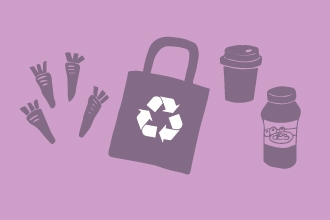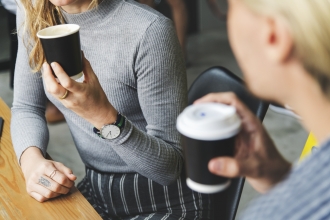Plastics and marine litter
Marine litter is not just unsightly, it can be harmful and toxic. 1 million birds and 100,000 marine mammals are killed by plastic litter every year around the world! The impact of marine litter is huge, affecting the health of wildlife and people. Over 600 marine species are reported to have encounters with marine litter, much of this is with plastic.
Biodegradation is the natural process where tiny organisms like bacteria break down materials. Plastic litter is not biodegradable, which means it will stay in the environment forever. With seven billion tonnes of debris entering the world's oceans annually, most of it long-lasting plastic, there's a lot of potential for harm to our birds and marine mammals. In parts of the ocean there is now more plastic than plankton!
There is no ‘away’ because plastic is so permanent and so indestructible
Other materials like metal will take hundreds of years to break down. Glass, like plastic, is not biodegradeable. These materials are particularly dangerous to people and wildlife. Sharp edges covered in bacteria and rust can lie easily hidden in sand and grass, posing as much of a threat to humans as wildlife.
Tackling litter costs Britain £1 billion a year! Frustratingly this is a problem that is easily solved. The Lincolnshire Wildlife Trust and East Lindsey District Council are urging people who visit the Lincolnshire coast to pick up their litter and help keep our coast clean and safe.
The problem might be global, but the solution starts at home
1. Say no to single use plastics
Start with the big 4, all can be replaced with a reusable version:
- Shopping bag
- Drinking water bottle
- Coffee cup
- Straws
Almost 200,000 plastic bottles are bought every second around the world. Less than half of these are recycled. Think of the impact we could have if we all used a refillable bottle, said no to straws and carried a canvas bag...
2. Reduce, reuse and recycle as much as possible
Much of what we buy can be recycled. We're doing a good job of kitchen recycling - but remember the rest of the house too! Shampoo bottles, batteries and even old electrical equipment can be recycled.
Being out and about is no excuse to forget good habits. Keep an eye out for public recycling bins or take that plastic bottle home to recycle. When shopping, don't buy products that are 'overpackaged' - wrapped in individual packs or several layers of plastic. Buy products in biodegradable packaging. Re-use your plastic shopping bags, or take cloth ones to the shops.
3. Check toiletries for microplastics
"Microplastics" are any plastics with a diameter of less than 5mm. This can be whole products (like nurdles or microbeads) or those created when larger plastic items already in the oceans fragment into smaller pieces. Microbeads are found in many toiletries and cosmetic products (toothpaste, face scrubs, make up) but are not caught during sewage treatment and so end up at sea. They have been found in fish destined for restaurants and even in the deep sea. Take the time to go through your bathroom cabinet and check the ingredients list for Polyethylene and Polypropylene. The manufacture of microbeads in the UK was banned earlier this year, with a total ban on sales planned for July 2018.
4. Use environmentally friendly detergents
Most washing detergents contain phosphates which can be damaging to freshwater and marine animals and lead to poor water quality in our rivers, lakes and estuaries. When you're shopping, check the labels on your products and whilst you're doing the washing, wash at a lower temperature.
5. Take care of our beaches
In the last 15 years the amount of litter on our beaches has almost doubled. The problem can seem overwhelming, but we can all play our part. As well as taking your litter home with you, why not join in on a beach clean?
6. Pick up your litter
Remember to put all litter in the bin and recycle when possible. Don't throw any litter in the street or gutter because it might end up in the ocean or on the beach. Spread the words and tell family, friends or people you see littering about the dangers of rubbish to marine animals and encourage them to do the right thing with their litter.
Further information
- SAS Marine Litter Report (https://www.sas.org.uk/wp-content/uploads/SAS-Marine-Litter-Report-Med.pdf)
- Scottish Government Marine Litter Issues (http://www.gov.scot/Publications/2012/09/6461/3)
- Queensland Government Department of Environment (https://www.ehp.qld.gov.au/coastal/management/beach_and_ocean_litter.html)








